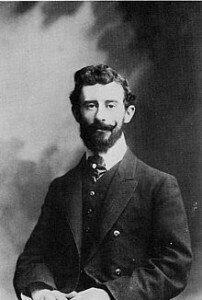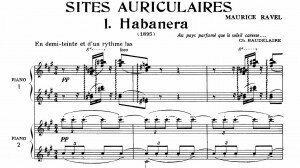
Photo of Maurice Ravel by Pierre Petit, 1907
 Not surprisingly, both works carried Spanish flavors. The opera L’heure espagnole would take over two years to finish, but most of the Rapsodie espagnole was written quickly as a set of four Spanish sketches. And predictably, the 1895 habanera blazed in full orchestral glory as the third movement. The premiere performance on 15 March 1908 turned out to be a mixed bag. The audience sitting in the expensive seats on the main floor reacted rather indifferently to the score, while Ravel’s students and friends sitting in the gallery were ecstatic. Amongst much applause and accolades, they were calling for an encore of the second “Malagueña” movement. That request was greeted by resounding booing from the main floor prompting the young composer Florent Schmitt to call out in a loud voice, “Just once more, for the gentlemen below who haven’t been able to understand it the first time.” Rather predictably, this contentious concert-hall encounter added, rather than subtracted from Ravel’s reputation.
Not surprisingly, both works carried Spanish flavors. The opera L’heure espagnole would take over two years to finish, but most of the Rapsodie espagnole was written quickly as a set of four Spanish sketches. And predictably, the 1895 habanera blazed in full orchestral glory as the third movement. The premiere performance on 15 March 1908 turned out to be a mixed bag. The audience sitting in the expensive seats on the main floor reacted rather indifferently to the score, while Ravel’s students and friends sitting in the gallery were ecstatic. Amongst much applause and accolades, they were calling for an encore of the second “Malagueña” movement. That request was greeted by resounding booing from the main floor prompting the young composer Florent Schmitt to call out in a loud voice, “Just once more, for the gentlemen below who haven’t been able to understand it the first time.” Rather predictably, this contentious concert-hall encounter added, rather than subtracted from Ravel’s reputation.